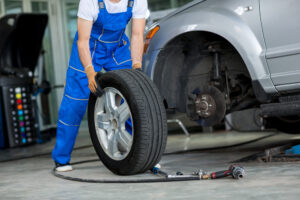290 S. Prospect Street, Medina, Ohio 44256
Monday - Friday 8AM - 5PM
290 S. Prospect Street, Medina, Ohio 44256
Monday - Friday 8AM - 5PM
Tires are a critical component of any vehicle, providing traction, stability, and safety on the road. However, like all parts of a car, tires wear out over time and need to be replaced. Determining the right time to replace your tires is essential for optimal performance and road safety. Here are some factors to consider when deciding how often you should replace your tires.

Tire tread depth is a primary indicator of tire wear and the need for replacement. Tread depth refers to the measurement of the space between the tire’s surface and the top of its deepest grooves. As tires wear down, the tread depth decreases, compromising their ability to grip the road effectively, especially in wet or slippery conditions. Most new tires have a tread depth of around 10/32 to 11/32 of an inch. It is generally recommended to replace tires when the tread depth reaches 2/32 of an inch, as this is the legal minimum in many regions. However, for improved safety and performance, it is advisable to replace tires before they reach this level, typically at around 4/32 of an inch.
Even if your tires have sufficient tread depth, their age can impact their performance and safety. Tires deteriorate over time, regardless of the amount of use they receive. As tires age, the rubber compound can harden, resulting in reduced traction and flexibility. Additionally, exposure to sunlight, extreme temperatures, and certain chemicals can accelerate the aging process. As a general guideline, replacing tires over six years old, regardless of their tread depth, is recommended. You can find the manufacturing date on the tire’s sidewall, represented by a four-digit number, with the first two digits indicating the week and the last two digits indicating the year of manufacture.
Your driving conditions and habits play a significant role in the lifespan of your tires. If you frequently drive on rough roads, uneven terrain, or surfaces with debris, your tires may wear out more quickly. Aggressive driving habits like hard braking, accelerating, and cornering can also contribute to tire wear. Additionally, if your vehicle is not properly aligned or the tire pressure is consistently low or high, it can lead to uneven wear patterns and premature tire deterioration. Regular maintenance, including tire rotations, alignments, and proper inflation, can help maximize the lifespan of your tires.
Regular visual inspections of your tires can provide valuable insights into their condition. Look for signs of uneven tread wear, bulges, cracks, or any damage that could compromise tire integrity. If you notice any of these issues, it is advisable to have your tires inspected by a professional and consider a replacement if necessary.
Finally, it is essential to refer to the tire manufacturer’s recommendations regarding tire replacement. They often provide guidelines specific to their tire models, taking into account factors such as tire type, usage, and expected lifespan. Following the manufacturer’s guidelines can help ensure that you get the most out of your tires while maintaining optimal safety.
Replacing your tires at the right time is crucial for maintaining your vehicle’s safety, performance, and handling. If you suspect it’s time to replace your tires or aren’t sure if it’s time to replace them, bring your car to Mighty Auto Pro. As a complete auto repair and care shop, we can help with all your tire needs – from tire replacement and tire rotation to tire pressure check and wheel bearing replacement. Contact us now to schedule an appointment.